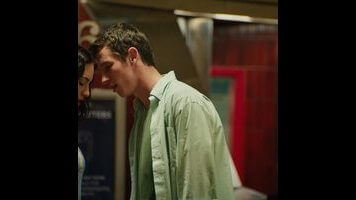Tramps like this, baby they were born to skip

Danny (Callum Turner), a Polish kid from Queens who runs a small-time bookie operation with his mom, gets a collect call from his no-goodnik brother, Darren (Michal Vondel). He’s in some trouble in Atlantic City, and needs Danny to take his spot on a job. All he has to do is get in a car with a mystery girl called Ellie (Grace Van Patten) and deliver a briefcase—a classic MacGuffin—to a woman with a green bag on the Astoria Boulevard station platform in one of those super-smooth under-the-bench exchanges, and then he can collect $1,500. Except, of course it’s the wrong woman with a green bag. And so the reluctant twosome of Danny and Ellie head off to Westchester, hoping to recover the briefcase; they got the address off a pill bottle. The guys they’re in trouble with, they don’t seem threatening. (Heck, one of them is played by Mike Birbiglia.) And the film itself is barely bluffing that it has any stakes; the caper is vague enough to be inconsequential. Tramps knows it’s small potatoes, but is it any better for it?
Like writer-director Adam Leon’s debut, Gimme The Loot, the Netflix-exclusive Tramps belongs to a species of trifle local to New York City. It’s a chatty pizza slice, turnstile, shoot-the-shit sort of movie—unspectacular, but with a nostalgia for certain earlier forms. It’s shot digitally, but framed in the cinephilic 1.66 aspect ratio, with lots of zooms, also a feature of Gimme The Loot. The plot and characterizations are as self-consciously phony as anything in the early French New Wave, but minus the experimental intent, the commentary on genre and the gaze, or the extreme personal investment. Van Patten can barely pretend to smoke a cigarette, and Leon’s occasional attempts at hard-boiled dialogue don’t do his young leads any favors. Neither is a presence on par with Gimme The Loot’s Ty Hickson and Tashiana Washington, but they’re cute. And that’s Tramps in a nutshell: nowhere near as charming as the movies it superficially recalls (including Leon’s own debut), but cute.
For some, that might be enough. There’s only one real purpose of Ellie and Danny’s shaggy-dog odyssey from the city and back, and that’s to afford them plenty of time to get to know each other while walking down train platforms, crowded sidewalks, and winding suburban streets. Thus, they enact the familiar dance of screwball courtship: He talks too much, she doesn’t talk enough, and before long, they find themselves hiding out in a rich family’s pool house, debating whether or not to sleep closer for warmth. There is a sort of pathological innocuousness to Tramps that extends from its choice of non-place locations (a lot of train stations, subway platforms, bus stations, and car interiors) to its no-frills camerawork, which makes effective use of street-smushing long focal lengths, but never suggests a feeling. Both in its briefcase-chasing Manhattan climax and its ostensibly romantic Greyhound finale, Tramps rejects emotional investment and urgency like a dieting diner who pores over a chophouse menu and then sheepishly asks for the salad.